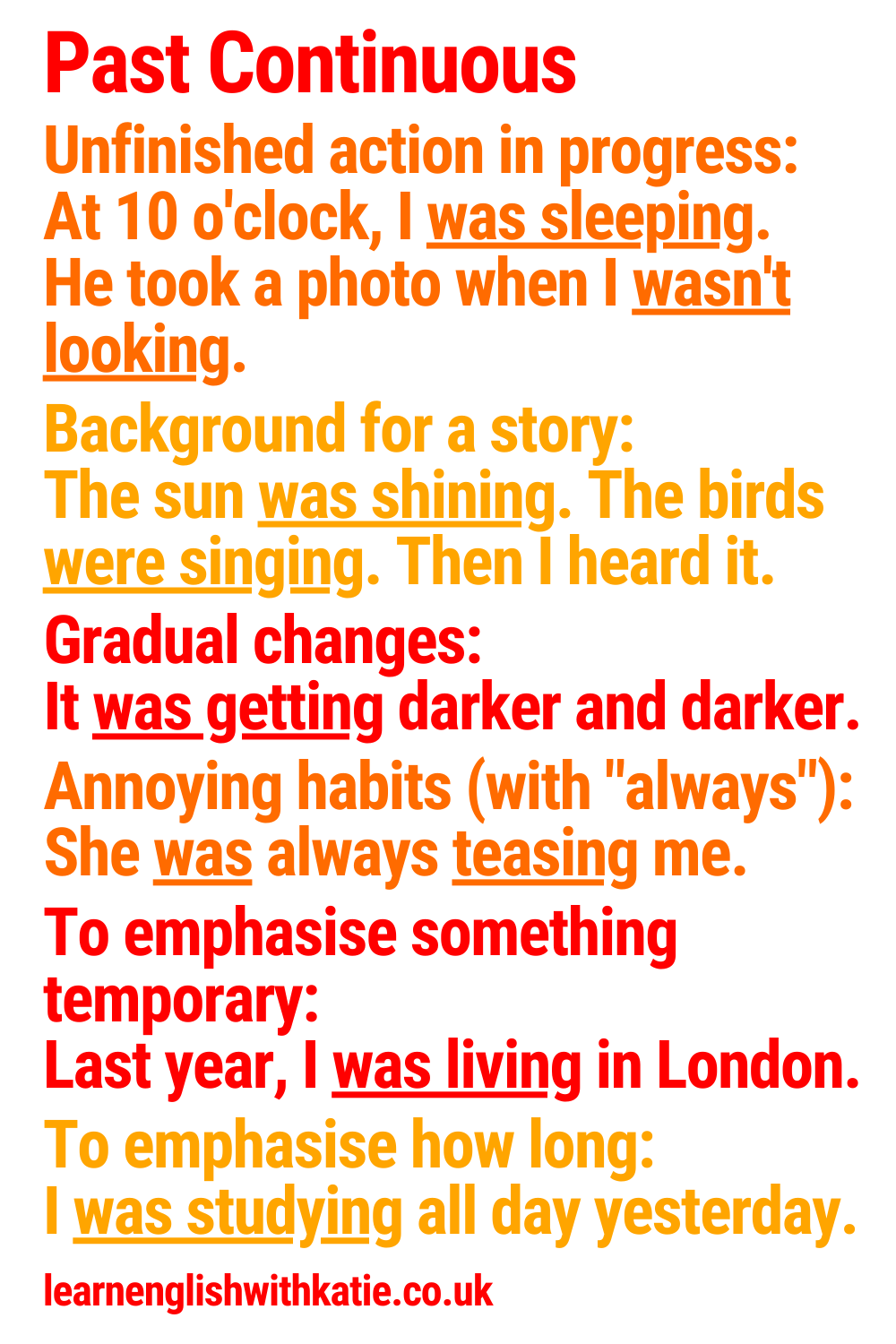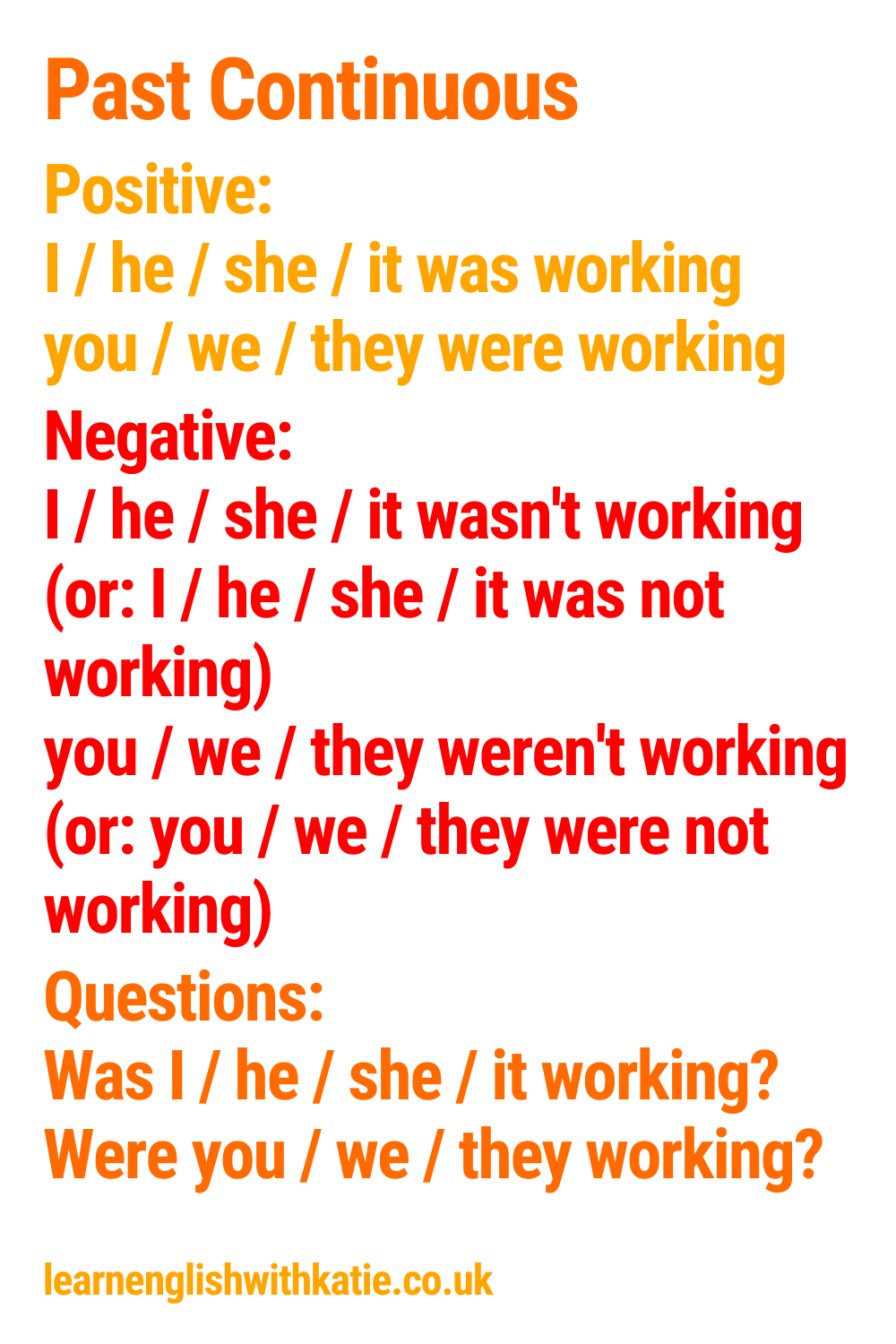|
This tense is sometimes called the past progressive. As the two names suggest, it is used to describe things which continued for some time in the past or were in progress at a particular moment. Click "read more" to learn all about this tense. Formation past continuous = was / were + ___ing Positive: Be: I / he / she / it was being, you / we / they were being Work: I / he / she / it was working, you / we / they were working Take: I / he / she / it was taking, you / we / they were taking Negative: Be: I / he / she / it was not being, you / we / they were not being (I / he / she / it wasn’t being, you / we / they weren’t being) Work: I / he / she / it was not working, you / we / they were not working Take: I / he / she / it was not taking, you / we / they were not taking Questions: Be: Was I / he / she / it being? Were you / we / they being? Work: Was I / he / she / it working? Were you / we / they working? Take: Was I / he / she / it taking? Were you / we / they taking? Spelling For rules on how to spell the -ing form, look at the post on present continuous. Uses 1. To describe an unfinished action in progress at a particular time: At 10 o’clock last night, I was already sleeping. This time last week, I was lying on the beach! 2. To describe an action in progress when another action occurs: If one thing happens in the middle of another, use the past continuous for the longer action to show that it was in progress when the other one happened. I was having a shower when the phone rang so I didn’t hear it. He broke his arm while he was skiing last winter. There could be two longer actions which happen at the same time. I was reading a book while my brother was playing a game on his phone. 3. To provide background information in a story: The birds were singing and the children were playing happily. Suddenly there was a loud noise like a gunshot! 4. To describe gradual changes in the past: Sadly, his health was declining with every passing day. It was getting darker and darker as she walked home. 5. Annoying habits in the past (with words like "always" and “constantly”): He was always teasing me when we were younger. She was for ever getting into trouble at school when she was a teenager! 6. Temporary past habits and situations: A few months ago, I was getting up at 6.30 every morning. This time last year, I was living in London. 7. To emphasise a long period of time I was studying all day yesterday. He was travelling round Europe all last summer. Common mistakes 1. They watched a football match on TV when I arrived. ❌ They were watching a football match on TV when I arrived. ✔️ Use past continuous for the longer interrupted action, not past simple. 2. He didn’t working last week. ❌ He wasn’t working last week. ✔️ We only use “didn’t” for the past simple, not the past continuous. 3. We were listening to the radio every day when I was a child. ❌ We listened to the radio every day when I was a child. ✔️ We usually use past simple for past habits, unless we want to express that it was annoying or temporary. (See points 5 and 6 above.) 4. I was going to Durham University. ❌ I went to Durham University. ✔️ We usually use the past simple to talk about main events, even if they are for a long time. You can use past continuous if you want to emphasise the length of time (see point 7 above) or for background events (see point 3). 5. My mother was calling me at 9 o’clock last night. ❌ My mother called me at 9 o’clock last night. ✔️ Use the past simple to describe a completed event at a specific time, not past continuous. 6. He wasn’t believing in God when we met. ❌ He didn’t believe in God when we met. ✔️ Non-action verbs are not usually used in continuous tenses. 7. He was breaking his leg on holiday. ❌ He broke his leg on holiday. ✔️ It is strange to use a continuous verb for an action that happens suddenly or in an instant. If you're wondering what to study next, you could try the past perfect here . If you would like more lessons and tips for how to learn English, click the button below and sign up for my newsletters:
0 Comments
Your comment will be posted after it is approved.
Leave a Reply. |
About the blogFollow the blog for mini lessons and tips on how to improve your English. Categories
All
Archives
July 2024
|


 RSS Feed
RSS Feed
